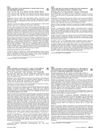 42 citations,
March 2006 in “Drug Discovery Today: Therapeutic Strategies”
42 citations,
March 2006 in “Drug Discovery Today: Therapeutic Strategies” The conclusion is that we need more effective hair loss treatments than the current ones, and these could include new drugs, gene and stem cell therapy, hormones, and scalp cooling, but they all need thorough safety testing.
 13 citations,
December 2017 in “BMC Complementary and Alternative Medicine”
13 citations,
December 2017 in “BMC Complementary and Alternative Medicine” The Asian herbal mix with Houttuynia cordata, Perilla frutescens, and green tea helped grow hair in mice.
 August 2018 in “Journal of The American Academy of Dermatology”
August 2018 in “Journal of The American Academy of Dermatology” Different treatments for skin conditions were found to be effective and generally safe, with biologics recommended as the first choice for generalized pustular psoriasis.
[object Object]  13 citations,
February 2018 in “Dermatologic Therapy”
13 citations,
February 2018 in “Dermatologic Therapy” Finasteride 2.5 mg/day can effectively treat female hair loss.
 October 2015 in “Elsevier eBooks”
October 2015 in “Elsevier eBooks” Finasteride helps hair growth and prostate issues but may cause sexual side effects and increase tumor risk.
 99 citations,
October 2006 in “BMC clinical pharmacology”
99 citations,
October 2006 in “BMC clinical pharmacology” Finasteride may cause slight depression and anxiety.
 51 citations,
October 2012 in “International Journal of Immunopathology and Pharmacology”
51 citations,
October 2012 in “International Journal of Immunopathology and Pharmacology” Finasteride works better than Serenoa repens for male hair loss.
 44 citations,
April 2015 in “PubMed”
44 citations,
April 2015 in “PubMed” Finasteride for hair loss may cause long-lasting side effects like impotence and low libido, but trials lack proper safety reporting.
 41 citations,
October 2011 in “Journal of Dermatology”
41 citations,
October 2011 in “Journal of Dermatology” Finasteride 1 mg effectively and safely increases hair growth in Japanese men with hair loss.
 24 citations,
July 2018 in “Drug Design Development and Therapy”
24 citations,
July 2018 in “Drug Design Development and Therapy” NTF gel improves finasteride delivery for hair loss treatment, reducing side effects.
 20 citations,
June 2015 in “Hormone Molecular Biology and Clinical Investigation”
20 citations,
June 2015 in “Hormone Molecular Biology and Clinical Investigation” Finasteride worsens erectile dysfunction and lowers testosterone in men with enlarged prostates, unlike tamsulosin.
 19 citations,
September 2016 in “Pharmacotherapy”
19 citations,
September 2016 in “Pharmacotherapy” Finasteride for hair loss increases risk of long-lasting sexual dysfunction.
 19 citations,
January 2015 in “Skin Pharmacology and Physiology”
19 citations,
January 2015 in “Skin Pharmacology and Physiology” Minoxidil foam effectively promotes hair growth and reduces hair loss in men.
 14 citations,
January 2019 in “Skin appendage disorders”
14 citations,
January 2019 in “Skin appendage disorders” PFS might be a delusional disorder with potential to become mass psychogenic illness.
 20 citations,
September 2015 in “Journal of The European Academy of Dermatology and Venereology”
20 citations,
September 2015 in “Journal of The European Academy of Dermatology and Venereology” Minoxidil foam promotes hair growth and reduces hair loss safely in men.
 6 citations,
November 2017 in “Skin appendage disorders”
6 citations,
November 2017 in “Skin appendage disorders” Topical botanical lotion increases hair density and improves quality of life in women with hair loss.
 1 citations,
October 2021 in “Gene, cell and tissue”
1 citations,
October 2021 in “Gene, cell and tissue” Grape sap may help reduce hair loss and promote hair growth in rats.
 August 2018 in “Journal of The American Academy of Dermatology”
August 2018 in “Journal of The American Academy of Dermatology” Ozenoxacin 1% cream is an effective and safe treatment for impetigo in children and adults.
 December 2014 in “Turk Dermatoloji Dergisi”
December 2014 in “Turk Dermatoloji Dergisi” Topical Saw Palmetto and Trichogen Veg Complex increased hair count by 11.9% and improved hair growth in 48% of men with hair loss.
 20 citations,
March 2006 in “Seminars in Cutaneous Medicine and Surgery”
20 citations,
March 2006 in “Seminars in Cutaneous Medicine and Surgery” Minoxidil and finasteride can help with hair loss, but more research is needed to improve treatments for certain types of hair loss.
1 citations,
November 2021 in “Ultrasonography” Ultrasound boosts finasteride's hair growth effects in mice.
 September 2024 in “Journal of Clinical and Nursing Research”
September 2024 in “Journal of Clinical and Nursing Research” Combining Chuzhi Shengfa tablets with finasteride is more effective for treating male hair loss than finasteride alone.
 11 citations,
March 2019 in “Journal of The American Academy of Dermatology”
11 citations,
March 2019 in “Journal of The American Academy of Dermatology” Some men taking finasteride for hair loss may experience sexual problems like erectile dysfunction and decreased sex drive, which can persist even after stopping the medication.
1 citations,
January 2013 in “PubMed” Adenosine led to higher patient satisfaction than minoxidil for hair loss treatment.
December 2022 in “International Journal of Pharmaceutics” The best starting dose for a new finasteride injection is 16.80 mg.
January 2016 in “Medicinski Podmladak”  70 citations,
February 2015 in “Expert Opinion on Drug Discovery”
70 citations,
February 2015 in “Expert Opinion on Drug Discovery” Topical drugs and near-infrared light therapy show potential for treating alopecia.
 August 2024 in “PLoS ONE”
August 2024 in “PLoS ONE” Combining PRP with Minoxidil improves hair density and thickness more than Minoxidil alone.
[object Object] July 2021 in “Journal of reports in pharmaceutical sciences” The 2% minoxidil nanosuspension is as effective as the commercial product but safer and easier to use.
 20 citations,
January 2017 in “Actas Dermo-Sifiliográficas”
20 citations,
January 2017 in “Actas Dermo-Sifiliográficas” Recent advances in hair loss treatments show significant progress.
























